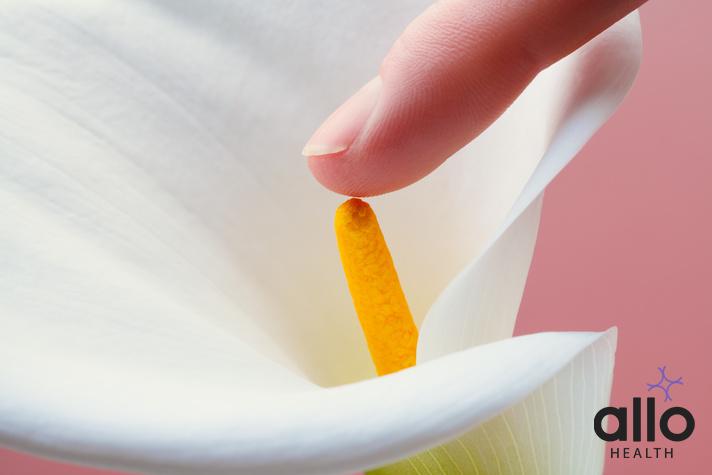Does Masturbation Cause Hormonal Imbalance?

"The following blog article provides general information and insights on various topics. However, it is important to note that the information presented is not intended as professional advice in any specific field or area. The content of this blog is for general educational and informational purposes only.
Book consultation
The content should not be interpreted as endorsement, recommendation, or guarantee of any product, service, or information mentioned. Readers are solely responsible for the decisions and actions they take based on the information provided in this blog. It is essential to exercise individual judgment, critical thinking, and personal responsibility when applying or implementing any information or suggestions discussed in the blog."
Masturbation is a topic that is still widely stigmatised in various cultures, which is why it is not surprising that myths and misconceptions about it are circulating. One of the most popular questions about masturbation is whether or not it causes hormonal imbalance.
This article aims to debunk the myths and provide a comprehensive understanding of how masturbation affects hormonal balance.
What is Masturbation?
- Masturbation is when someone touches or rubs their own genitals for sexual pleasure. It is a common and natural way for people of all genders express their sexuality.
- Masturbation is seen as a normal part of human sexuality and can be a healthy way for individuals explore their own bodies and sexual responses.
- It generally does not cause any physical or psychological harm and is a personal decision.
Health Benefits of Masturbation
Masturbation, a natural and common form of sexual expression, offers several potential benefits:
- Masturbation can stimulate the release of endorphins, which are natural chemicals in the body that promote a sense of well-being and relaxation, thus helping to reduce stress.
- The release of endorphins during masturbation may improve sleep quality, aiding in the ability to fall asleep and stay asleep.
- Masturbation has been found to potentially provide pain relief for conditions such as menstrual cramps, headaches, and other types of pain due to the release of endorphins.
- Sexual satisfaction can offer a safe and healthy means of self-exploration, understanding desires and preferences, resulting in enhanced sexual satisfaction and confidence.
- Certain studies indicate that sexual activity, including masturbation, may potentially improve immune function by increasing the production of antibodies.
- Regular ejaculation may have potential benefits for individuals with penises, as it may aid in flushing out toxins and potentially reduce the risk of developing prostate issues.
- Masturbation can stimulate the release of neurotransmitters like dopamine and oxytocin, potentially improving overall mood and mental health well-being.
- Masturbation and orgasm have been found to release endorphins, which may potentially provide relief from menstrual cramps for individuals with vaginas.
- Masturbation is known to have potential benefits for pelvic floor health, including strengthening pelvic floor muscles and potentially improving bladder and bowel control.

Can Masturbation Cause Hormonal Imbalance?
- There is no scientific evidence to support this claim.
- Masturbation is not known to have any effect on hormone levels in general.
- While some research suggests that masturbation can cause changes in hormonal levels, these changes are minimal and don’t have any real effect.
Symptoms of Hormonal Imbalance
Hormonal imbalance can manifest in various ways, and the specific symptoms may vary based on which hormones are affected. Common symptoms of hormonal imbalance include:
- Irregular periods: Women may experience changes in the length, flow, or timing of their menstrual periods.
- Mood swings: Fluctuations in hormone levels can lead to mood changes, including irritability, anxiety, or depression.
- Weight fluctuations: Hormonal imbalances can contribute to weight gain or difficulty losing weight.
- Fatigue: Feeling consistently tired or experiencing low energy levels.
- Changes in libido: A decrease or increase in sexual desire and interest.
- Sleep disturbances: Difficulty falling asleep, staying asleep, or experiencing poor sleep quality.
- Skin problems: Hormonal imbalances can lead to acne, oily or dry skin, and changes in skin texture.
- Hair issues: This may include hair loss or excessive hair growth in areas where it’s not desired.
- Digestive problems: Changes in appetite, digestion, or bowel movements.
- Hot flashes: Sudden and intense feelings of heat, often accompanied by sweating.
- Headaches or migraines: Hormonal shifts can trigger headaches or make existing ones worse.
- Changes in breast tissue: Swelling, tenderness, or changes in breast size or texture.
- Changes in body temperature: Feeling unusually hot or cold, unrelated to the environment.
- Bone density changes: Hormonal imbalances can affect bone health, potentially leading to conditions like osteoporosis.
- Cognitive issues: Difficulty with memory, concentration, or focus.
- Changes in heart rate: Hormonal imbalances can sometimes lead to palpitations or irregular heartbeats.
- Digestive problems: This can include bloating, constipation, or diarrhea.
- Changes in urination: This may involve increased frequency or changes in urine volume.
Excessive Masturbation Side Effects
Excessive masturbation, while generally considered a normal part of human sexuality, can potentially lead to a few side effects in some individuals. These may include:
- Physical discomfort: Engaging in excessive masturbation can lead to soreness, chafing, or irritation of the genitals.
- Fatigue and weakness: Intense or frequent masturbation sessions might lead to temporary feelings of fatigue or weakness.
- Impact on relationships: In some cases, excessive masturbation can have a negative impact on relationships through neglect of intimate relationships, potentially causing strain.
- Loss of interest in other activities: Spending excessive time on masturbation may lead to neglect of other hobbies or activities.
- Difficulty achieving orgasm: In some cases, individuals who engage in frequent masturbation may find it challenging to climax with a partner.
- Guilty feelings or shame: Some individuals may experience emotional distress or feelings of guilt associated with excessive masturbation.
- Distraction from responsibilities: If not balanced with other aspects of life, excessive masturbation may lead to a lack of focus on work, studies, or daily responsibilities.
- Potential psychological effects: While rare, in some cases, excessive masturbation may be a symptom of an underlying psychological concern that should be addressed with professional help.
These effects are not universal and may vary from person to person.

Myths about Masturbation
There are several myths surrounding masturbation that have persisted over time. It’s important to address these misconceptions with accurate information. Here are some common myths about masturbation:
- Masturbation causes physical harm: This is not true. Masturbation is a normal and safe sexual activity that does not lead to any physical harm or health problems.
- It causes mental health concerns: Masturbation, in moderation, does not lead to mental health problems. In fact, it can be a healthy way to explore one’s own body and sexuality.
- It leads to infertility: This is a misconception. Masturbation does not cause infertility. In fact, it’s a completely separate process from reproduction.
- It causes erectile dysfunction: Regular masturbation does not lead to erectile dysfunction. In fact, it can help individuals become more in tune with their own sexual responses.
- It decreases sexual desire: The opposite is often true. Masturbation can help increase sexual desire and provide a healthy outlet for sexual needs.
- It’s only for singles: Masturbation is a normal part of sexual health for both single and partnered individuals. It can be a healthy aspect of one’s sexuality regardless of relationship status.
- It’s only for men: This is a common misconception. Masturbation is a natural and healthy aspect of human sexuality for people of all genders.
- It causes physical weakness: Engaging in moderate masturbation does not lead to physical weakness. In fact, it can be a way to relieve tension and stress.
- It leads to STDs: Masturbation is a solitary sexual activity and does not involve the exchange of bodily fluids, so it does not transmit sexually transmitted infections.
- It’s morally wrong or sinful: This is a subjective belief and varies based on cultural, religious, and personal perspectives. Many societies and cultures accept masturbation as a normal part of human sexuality.
What is Masturbation Addiction?
- Masturbation addiction, clinically referred to as Compulsive Sexual Behavior Disorder (CSBD), is characterised by an excessive and uncontrollable urge to engage in masturbation or sexual activities that significantly affects the quality of life.
- This behavior can have a significant impact on one’s well-being and can disrupt daily activities, work, and relationships.
- It is recommended for individuals experiencing this to seek professional help, as it can be effectively managed through therapy and support.
Treatment Options for Masturbation Addiction
Treatment options for masturbation addiction, clinically known as Compulsive Sexual Behavior Disorder (CSBD), aim to help individuals regain control over their sexual behaviors and improve their overall well-being. Here are some effective approaches:
- Therapy: Individual therapy with a qualified therapist, such as a psychologist or counsellor, can be highly effective. Cognitive-behavioral therapy (CBT) is commonly used to address the underlying causes of addiction and develop healthier coping strategies.
- Support groups: Joining a support group or 12-step program, like Sex Addicts Anonymous (SAA), can provide a sense of community and shared experiences, promoting recovery.
- Medication: In some cases, medication may be prescribed to address underlying issues such as anxiety or depression, which can contribute to addiction.
- Mindfulness and meditation: Mindfulness techniques can help individuals become more aware of their impulses and develop better self-control. Meditation can also reduce anxiety and stress, which may trigger addiction.
- Alternative activities: Encouraging the individual to engage in alternative, fulfilling activities like exercise, hobbies, or social interactions can help redirect their focus away from masturbation.
- Limiting triggers: Identifying and avoiding triggers that lead to excessive masturbation, such as certain websites or environments, can be part of the treatment plan.
- Relapse prevention: Learning to recognise early warning signs of relapse and developing strategies to prevent it is crucial. This may involve creating a relapse prevention plan with a therapist.
- Education: Providing education about healthy sexual behaviors and the potential consequences of addiction can help individuals understand their condition better.
- Self-help materials: Utilising self-help books, online resources, or mobile apps designed for addiction recovery can complement therapy and support group participation.
- Lifestyle changes: Encouraging a healthy lifestyle with proper diet, exercise, and adequate sleep can contribute to overall well-being and help reduce the risk of addiction relapse.
- Family involvement: In some cases, involving family members in therapy or support can provide a strong support network and help rebuild relationships affected by addiction.
- Professional evaluation: Consulting with a medical professional to rule out any underlying medical conditions contributing to addiction is important.

Key Takeaways
- Masturbation is a natural and common form of sexual expression for people of all genders, offering numerous health benefits and posing no harm.
- It does not cause hormonal imbalance; scientific evidence does not support this claim. Any changes in hormonal levels are minimal and have no significant effect.
- Excessive masturbation can lead to physical discomfort, fatigue, strain on relationships, loss of interest in other activities, difficulty achieving orgasm, guilty feelings, distraction from responsibilities, and potential psychological effects.
- There are several common myths about masturbation, including notions that it causes physical or mental harm, infertility, erectile dysfunction, decreased sexual desire, and more. These are inaccurate.
- Masturbation addiction, also known as Compulsive Sexual Behavior Disorder (CSBD), can be effectively managed through therapy, support groups, medication, mindfulness, and various lifestyle changes.
- Treatment options for CSBD include therapy, support groups, medication, mindfulness, engaging in alternative activities, limiting triggers, relapse prevention, education, self-help materials, lifestyle changes, family involvement, and professional evaluation.
Frequently Asked Questions
Q: Does female masturbation cause hormonal imbalance?
A: No, there is no scientific evidence to suggest that female masturbation leads to hormonal imbalance. Masturbation is a normal and healthy aspect of human sexuality and does not have a significant impact on hormone levels.
Q: How does masturbation become addictive?
Masturbation can become addictive when it starts to interfere with daily life, relationships, and responsibilities. This can happen due to the release of endorphins during masturbation, creating a pleasurable sensation that some individuals may seek compulsively.
Q: What is the role of oxytocin in masturbation?
A: Masturbation increases the production of oxytocin. During masturbation, the body releases oxytocin, often referred to as the “bonding hormone.” This hormone plays a role in facilitating feelings of intimacy and connection, contributing to the overall pleasurable experience.
Q: Can masturbation cause sexual dysfunction?
A: Masturbation, when practiced in moderation, is not known to cause sexual dysfunction. In fact, it can be a healthy aspect of one’s sexual expression and may even contribute to a better understanding of one’s own body and sexual responses.
Q: Can excessive masturbation cause premature ejaculation?
A: Yes, excessive masturbation may lead to premature ejaculation for some individuals. This can occur due to desensitisation and conditioning of the body’s response to sexual stimulation.







































